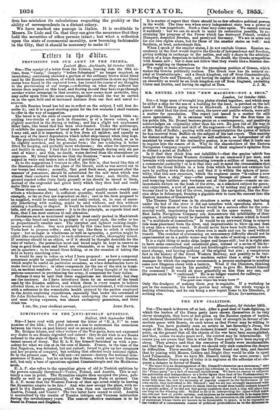MR. B . RUNEL IND THE "NEW MACHINE—NOT. A SHIP."
London, lat October 1855.
Sin—A large mass of wrought iron, plates riveted together, and which may be either a ship for the sea or a building for the land, is perched on the left bank of the Thames going down to Blackwell. A. former report of the en- gineer stated that the stem and stern, the screw and paddle-wheels, were still a matter. for speculation. The report just issued its a matter for still. more speculation. It is ominous with wonder. For the first time he hie public lifiN Mr. Brunel bestows praise on a contemporary, and positively, acknowledges an originality other than his own. Re goes out of his way to acknowledge the talent and skill of the engineers—of Buffalo, and especially of Mr. Bull of Buffalo • quoting with self-congratulation the quires of letters he has received from Reale on the-subject of his lad report. This anxiety for distant suffrage in one usually so self-sufficient, so independent of all mankind by reason of his instinctive genius, is so unusual that it leads one to inquire into the reason of it Why do the shareholders of the Eastern. Navigation Company require confirmation of their engineer's opinions from so distant a point as Buffalo ? Is it that they think him not infallible ?—that the genius 'which has brought down the Great Western dividend to an unearned 2 per cent, and. lawsuits with contractors approximating towards a million of money, is DO*: a commercial authority ? or is it that they call to mind the eircumatanee- that he built the Great Britain in a hole from which he could not extricate her- save by pulling down the dock ; and that it is within the sphere of possi- bility, that this new structure, which the engineer states "is-rather mnew maehine than a ship," may—after passing through all phases of faney,. and wearying builders and workmen out. of their patience—remain an un- launchable fixture on the bank of the river, as a standard subject for peren- nial experiment, a sort of pone asinorum ; or by mishap may go askew and become fixed in the bed of the river, impeding the navigation, like the Rus- sian ships in Sebastopol, formings gigantic weir to turn the current into the Eastern marshes of Greenwich ?
The Thames Tunnel was in its structure a series of mishaps, but being under the bed of the river it did not interfere with operations above. A mishap of this mass of iron in the bed would be a serious affair for the com- mercial world, imprisoning the many craft in the upper waters. Till the East ladia Navigation Company can demonstrate the infallibility of their engineer, it certainly would be desirable to seek the wisdom which is found in a multitude of counsellors." It would be an awkward thing to remove this mass piecemeal from the river, and impracticable, to blow-up and float. it away like a wooden vesseL It should never have been built there, but in the Northern or Southern ports where iron is made and can be used without ttansit. The crotchet of overcoming an unnecessary difficulty should not be experimented on in a public water-way for the sake of makings sensation. It is a right thing to make ships larger and largerstill ; but it is right also to have some connected and considered plan, instead of a aeries of bit-by- bit contrivances—afterthought and not forethought—wasting capital in con- stant change, and leaving nothing of the original but size ; a conspicuous fact in the history of the Great Western Railway, and possibly to be imi- tated in the Great Eastern "-new machine rather than a ship," to find a manager for which the engineer recommends a process analegousto sending same new Diogenes about with a lantern. What if the Directors, thinking "none, but himself can be his parallel," were to give Mr. Brunel himself the command ? It would sit more gracefully on him than any one, and Diogenes could be "cushioned." Ile is no longer wanted for railways.
" His work is over, over now ;
The good man wipes his weary brow ?"
Only the drudgery of making them pay is requisite. If a workshop be put in the mammoth, his fertile genius may occupy the whole voyage in making alterations, and he can bring a new report home to his Directors, if


























 Previous page
Previous page